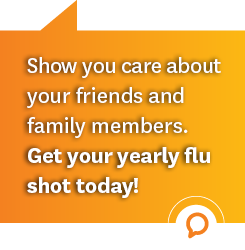
Get Your Flu Shot
No one likes getting sick.
And the flu virus changes every year. So, getting a yearly shot helps protect yourself and those around you. Plus, it’s available at no cost to you.
The flu shot is a good idea for just about everyone. But these people are at an even higher risk of health problems from the flu:

Pregnant Moms
Pregnancy can put you at higher risk for getting the flu and put your unborn baby at risk, too. But getting a flu shot can help protect you and your baby.
Children and Families
Young children have a higher risk of health problems from the flu. Newborns are also at a high risk but can’t get the flu shot until they are six months old.


People with a Chronic Condition or Caregivers
People with a weakened immune system are more likely to get very ill from the flu. Getting your yearly flu shot helps protect yourself and those around you.
Seniors or Those Who Care for Them
Our immune defenses weaken with age. And people age 65 and older are at a higher risk for health issues from the flu. If you’re a senior or live with seniors, a flu shot will help protect you all.

Find a Doctor or Pharmacy
Find a doctor or pharmacy near you to get your flu shot.

MU Health Care is offering drive-thru flu and Covid shot events at various locations.
Affinia Healthcare, at their Salvation Army Midtown Treatment and Services Center is offering Flu, RSV and COVID vaccines as follows:
Wednesdays - 9am - noon
Thursdays - 9am - noon
Fridays - 9am to 2pm
Walk-ins welcome. For more information call 314-797-7486
![]()
Why get your flu shot every year?
- Flu viruses are always changing. Scientists predict which virus will be most common each year. Flu vaccines are changed each flu season to make them work as well as possible.
- Your protection with the flu shot gets weaker over time. That’s why a yearly flu shot is needed to help keep you from getting sick.
![]()
Can the flu shot give me the flu?
No. The flu vaccine is made from either inactive flu virus or none at all. That means getting a flu shot cannot give you the flu. But it can reduce your chances of catching the flu.
![]()
When and where should you get your flu shot?
- You should get a flu shot before the flu starts spreading where you live. Fall is the best time to get your yearly shot. If possible, get the shot by the end of October.
- You can get your flu shot in many doctor’s offices. You can also get it in pharmacies, clinics and health centers. Vaccines may also be offered at schools or your workplace.
![]()
Is the nasal flu vaccine a recommended alternative to the flu shot?
Yes. CDC is recommending the nasal flu vaccine as an option (for certain people). Talk to your doctor or healthcare provider about whether this is an appropriate option for you.
![]()
How do you know if someone has the flu?
The flu is different from a cold. The flu usually comes on suddenly. People who have the flu often feel some or all of these symptoms:
- Fever
- Cough
- Sore throat
- Runny or stuffy nose
- Muscle or body aches
- Headaches
- Fatigue or tiredness
- Some people may have vomiting and diarrhea. This is more common in children than adults.
![]()
Where should you go if you have flu symptoms?
Visit your doctor or urgent care or call the nurse advice line with any health questions. Unless you have a very high fever or trouble breathing, you should not need to go to the emergency room for the flu.
Don’t let the flu get you! Three Easy Steps to Avoiding the Flu:
1. Get your flu shot!
- Getting a flu vaccination is the best way to prevent the flu.
- Flu shots are most important for people at high risk and their close contacts. These people include:
- Children
- Pregnant women
- People with chronic health conditions such as heart disease, asthma, etc.
- People age 50 and older
- Complications of the flu include pneumonia. Adults 50 and older should get a pneumonia vaccine. People who have a chronic illness; a weakened immune system; or live in a nursing home should also get a pneumonia shot. This vaccine protects against a bacteria which causes pneumonia as well as meningitis and bloodstream infections. This can be given at the same time as the flu shot if needed.
2. Keep your hands clean!
- Wash your hands with soap and water.
- Cover your nose and mouth with a tissue when you cough or sneeze.
- Don’t touch your eyes, nose or mouth. This is how germs can spread.
3. Be a hero!
- If you get the flu, try and stay away from others.
- If you care for others who are at high risk, such as young children or older parents, get a flu shot.
- Take antiviral drugs if your Primary Care Provider (PCP) says to. These can help treat the flu and sometimes can prevent it.
Approval Code: HSH23043 | 9/20/2022

